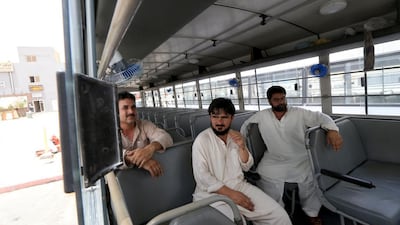ABU DHABI // Depression, lack of sleep, family problems abroad, non-payment of wages and reckless driving by others are some of the reasons for tragic road accidents involving workers, bus drivers say.
They also believe the quality of buses is poor and lack of air conditioning makes many workers fear drivers could be put to sleep.
Drivers and the workers they transport expressed their concerns after a horrific accident in Dubai on Saturday in which 13 labourers were killed.
Taking the bus home after work is the “biggest challenge”, they say.
“Drivers get tense when they hear news of some family dispute back home, which puts them under mental stress,” said Mohammed Afridi, a Pakistani bus driver. “This affects their driving and results in accidents.”
Mr Afridi, 40, has driven buses to and from Workers Village in Mussaffah for the past 14 years, and earns Dh2,500 a month.
Drivers rise at 5am and start bringing workers to their sites from 6am. About 6pm they take the labourers home.
Mr Afridi said non-payment of wages when dependents needed money at home also puts drivers under tremendous mental pressure.
Those pressures can lead to loss of sleep, which can lead to bad driving, he said.
Mr Afridi said motorists in large 4x4s drive rashly and veer into other lanes – particularly in the morning.
“They don’t think about how they put other lives at risk and create big challenges for us,” he said.
“Buses are made of aluminium, which is very delicate and bends easily. And in case of minor accidents, buses turn into piles of paper card.”
Mr Afridi called for more regulation by the Government to improve safety.
These calls were echoed by Jehangir Khan, a 50-year-old bus driver.
“Authorities should improve the quality of buses,” Mr Khan said. “If they are not permitted on roads if they do not follow safety standards, we will get good quality buses.”
This would ensure the safety of all workers, Mr Khan said, who is from Pakistan.
Suhail Waqar, 32, a metal fabricator from Pakistan who lives in International City Abu Dhabi, said: “Accidents occur due to lack of attentiveness and drowsiness due to a lack of proper sleep.
“The biggest problem in these substandard buses is that they don’t have air-conditioning.
“Many workers, when they come back from work, fall unconscious due to heat inside buses, which were parked under the sun.”
Indian Manohar Lal, a welder, said the accident on Saturday showed the dangers for labourers on their daily trip to and from work.
“Our lives are always at risk, whether in a bus or onsite,” said Mr Lal, 30. “Our work starts in hot and humid temperature and ends like that.
“On cooler days it’s fine to take non-air conditioned buses but during summer when the temperature reaches up to 50°C, it is a matter of serious consideration.”
Mr Lal, who came to the UAE three years ago and also lives in the Mussaffah camp, said while safety has improved on worksites the same could not be said for the buses.
Workers consider the biggest challenge is to take a bus back to the accommodation after finishing a shift.
They say they are scared of being “parboiled” inside.
“We toiled all the day under the sun and are sweating – now we have to take the heated bus, which doubles the challenge,” said Ali Zuhaib, a 27-year-old metal fabricator who also lives in Mussaffah.
Another driver, Shakir Lachi, 28, said he and his colleagues did not speed because they would be hit with fines.
“Beyond 80kph, radars will flash and we have to pay fines,” Mr Lachi said. “Why would we do that to pay from our pockets as we toil here on meagre salaries and finance our all requirements, and send money back home too?
“We are not scared of accidents but only cars that drive rashly. In fog and rain we drive carefully.”
anwar@thenational.ae

